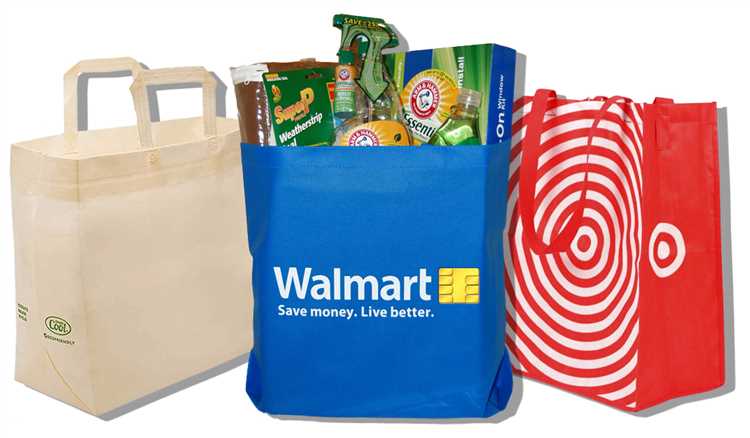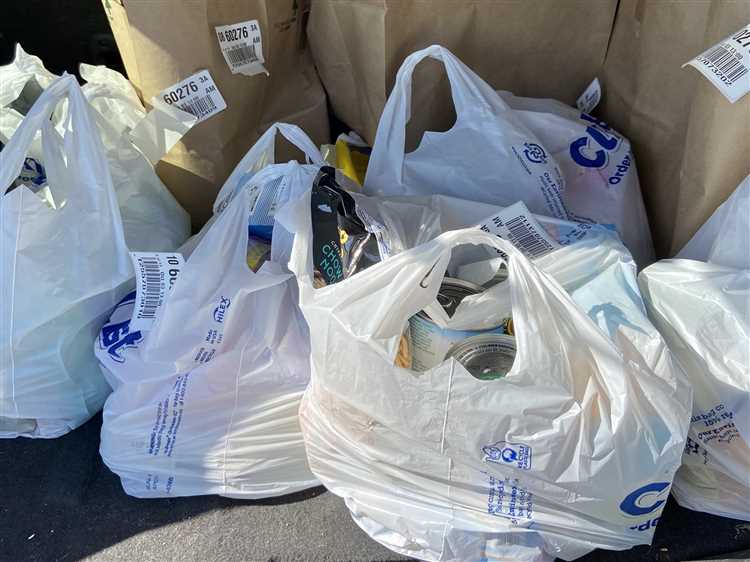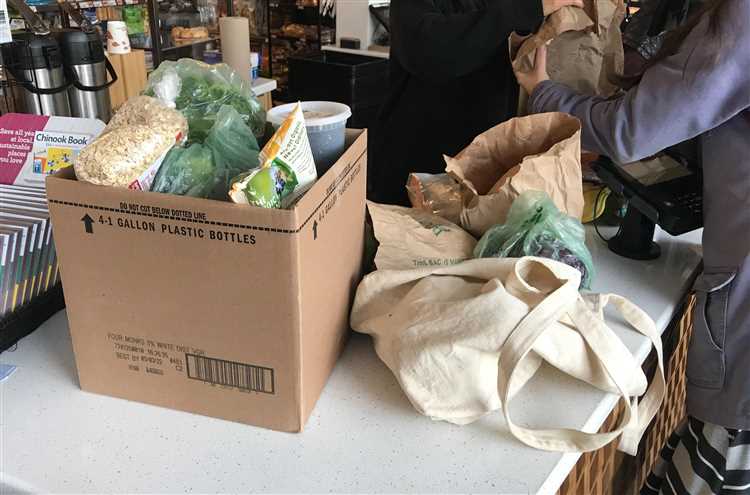If you’ve ever shopped for groceries in Oregon, you may have noticed something different about the way your items were bagged. Unlike many other states, where grocery bags are freely provided by stores, Oregon has implemented a unique policy regarding the use of plastic and paper bags. It’s important to be aware of these regulations so that you can plan your shopping trips accordingly.
In 2019, Oregon became the third state in the United States to ban single-use plastic bags. This means that stores are no longer permitted to offer plastic bags for free at checkout. Instead, shoppers have a few options. They can choose to bring their own reusable bags, purchase a reusable bag provided by the store, or opt for paper bags, which are typically available for a small fee.
The goal of this legislation is to reduce plastic waste and promote sustainable practices. By discouraging the use of single-use plastic bags, Oregon hopes to encourage shoppers to bring their own bags and ultimately reduce the amount of plastic that ends up in landfills and pollutes the environment.
It’s worth noting that certain exemptions apply to this ban. For example, plastic bags are still allowed for certain types of products, such as fresh produce, meat, and bulk items. Additionally, small retailers with limited annual sales may be exempt from the ban. However, it’s best to check with individual stores to confirm their specific policies and any potential fees associated with bag usage.
Overall, the free bag policy in Oregon is a reflection of the state’s commitment to environmental sustainability. By being informed about these regulations, you can play your part in reducing waste and protecting the beautiful natural resources that Oregon is known for.
- Are grocery bags free in Oregon?
- Here’s what you need to know:
- Grocery Bag Law in Oregon
- Exemptions and Restrictions
- Fees for Paper Bags
- Oregon’s Approach to Grocery Bags
- How the state is tackling plastic pollution
- Plastic Bag Ban in Oregon
- What you need to know about the ban on single-use plastic bags
- 1. What is the ban?
- 2. Why was the ban implemented?
- 3. What are the alternatives?
- 4. Are there any exceptions?
- 5. What are the penalties for non-compliance?
- Question-answer:
- Is there a ban on plastic bags in Oregon?
- Are grocery bags free in Oregon?
- Can I still get paper bags at the grocery store in Oregon?
- What is the purpose of the plastic bag ban in Oregon?
- Are there any exceptions to the ban on plastic bags in Oregon?
- Are grocery bags free in Oregon?
- What type of bags can I use for groceries in Oregon?
Are grocery bags free in Oregon?
Oregon is one of the few states in the United States that has implemented a statewide ban on single-use plastic bags in grocery stores. This means that in Oregon, grocery bags are not free and customers are required to bring their own reusable bags or purchase them at the store.
The ban on plastic bags went into effect in 2020, and applies to all retail establishments that sell food, including grocery stores, convenience stores, and farmers markets. It is aimed at reducing plastic waste and promoting sustainability.
Under the ban, retailers are allowed to provide paper bags or reusable bags to customers, but they must charge a minimum of five cents per bag. The purpose of the charge is to encourage customers to bring their own bags and reduce their reliance on single-use options.
It is important to note that there are some exceptions to the ban. Certain types of plastic bags, such as those used for bulk items like fruit and vegetables, are still allowed. Additionally, customers who are enrolled in the Supplemental Nutrition Assistance Program (SNAP) are exempt from the bag charge.
Overall, while grocery bags are not free in Oregon, the statewide ban on single-use plastic bags is a positive step towards reducing plastic waste and promoting environmentally-friendly practices.
Here’s what you need to know:
Grocery Bag Law in Oregon

The state of Oregon has implemented a statewide law that restricts the use of single-use plastic bags in grocery stores. This means that customers are required to bring their own reusable bags or purchase paper bags for a small fee.
Exemptions and Restrictions
There are certain exemptions and restrictions to the grocery bag law in Oregon. Some smaller retailers, such as convenience stores, are not required to comply with the law. Additionally, certain types of bags, such as those used for meat, produce, and bulk items, are exempt from the restrictions.
Fees for Paper Bags
If you forget to bring your own reusable bags or choose not to, you have the option to purchase paper bags from the grocery store. However, these paper bags are not free. Retailers are required to charge a fee for each paper bag provided. The fee helps encourage customers to bring their own bags and reduce waste.
| Bag Type | Fee |
|---|---|
| Large Paper Bag | $0.10 |
| Small Paper Bag | $0.05 |
It is important to note that grocery stores are required to clearly display the fees for paper bags, and the fees collected are used to cover the cost of providing and recycling paper bags. The law aims to promote environmental sustainability by reducing the consumption of single-use plastic bags.
By bringing your own reusable bags or opting for paper bags and paying the associated fees, you can help minimize plastic waste and contribute to a greener Oregon.
Oregon’s Approach to Grocery Bags
Oregon has taken significant steps to address the issue of single-use plastic bags in grocery stores. Unlike many other states in the United States, Oregon has implemented a statewide ban on disposable plastic bags at grocery stores. This ban includes both thin plastic bags and thicker reusable plastic bags.
Instead of using plastic bags, shoppers in Oregon are encouraged to bring their own reusable bags or purchase paper bags. However, it is important to note that paper bags are not always provided for free. In some cases, grocery stores may charge a small fee for each paper bag used to discourage excessive paper bag consumption.
In addition to the ban on plastic bags, Oregon has also implemented measures to encourage the use of reusable bags. Many grocery stores provide incentives for customers who bring their own bags, such as discounts or rewards points. This helps to promote a culture of sustainability and reduce the reliance on single-use items.
Oregon’s approach to grocery bags is part of a larger effort to reduce waste and protect the environment. By encouraging the use of reusable bags and eliminating single-use plastic bags, Oregon is taking proactive steps towards a more sustainable future.
How the state is tackling plastic pollution
Plastic pollution is a growing concern in Oregon, and the state is taking proactive measures to address the issue. One way the state is tackling plastic pollution is by implementing a ban on single-use plastic bags in many cities and counties. This has been done to discourage the use of these bags and encourage people to bring their own reusable bags when shopping.
In addition to the ban on single-use plastic bags, the state is also exploring other measures to reduce plastic waste. This includes promoting the use of reusable water bottles and encouraging businesses to use eco-friendly packaging.
Furthermore, Oregon is working towards educating the public about the harmful effects of plastic pollution on the environment. By raising awareness and providing information, the state hopes to empower individuals to make more sustainable choices in their daily lives.
Efforts are also being made to improve recycling infrastructure in the state. This includes increasing access to recycling facilities and promoting the proper disposal of plastic waste. By making it easier for people to recycle, the state aims to reduce the amount of plastic ending up in landfills and oceans.
The state of Oregon understands the importance of collective action when it comes to tackling plastic pollution. By implementing these measures and raising awareness, the state is taking steps towards a cleaner and more sustainable future.
Plastic Bag Ban in Oregon
Oregon has implemented a ban on single-use plastic bags in an effort to reduce waste and protect the environment. The ban applies to large retailers, including grocery stores, pharmacies, and convenience stores, with some exceptions.
The ban encourages consumers to bring their own reusable bags when shopping and aims to promote sustainable alternatives to plastic bags. By eliminating single-use plastic bags, Oregon hopes to reduce litter, protect wildlife, and minimize pollution in landfills and waterways.
Under the ban, retailers are allowed to charge a fee for paper bags, which serves as an incentive for customers to bring their own bags. The fee is typically around five cents per bag and encourages individuals to make more conscious choices about their consumption habits.
It’s important for Oregon residents and visitors to be aware of the plastic bag ban and to come prepared with reusable bags when shopping. By making small changes in our daily lives and choosing sustainable alternatives, we can all contribute to a greener future for Oregon and the planet.
What you need to know about the ban on single-use plastic bags
Oregon is one of several states that has implemented a ban on single-use plastic bags in an effort to reduce plastic waste and protect the environment. Here is what you need to know about this ban:
1. What is the ban?

The ban on single-use plastic bags means that retailers in Oregon are no longer allowed to provide customers with plastic bags at checkout. This includes both thin plastic bags and thicker reusable plastic bags.
2. Why was the ban implemented?

The ban on single-use plastic bags was implemented in Oregon to reduce the amount of plastic waste that ends up in landfills, oceans, and other natural environments. Plastic bags are known to be particularly harmful to wildlife, and they can take hundreds of years to decompose.
3. What are the alternatives?
Instead of providing plastic bags, retailers in Oregon are required to offer alternative options to customers. This can include reusable bags made from materials like cloth or canvas, paper bags, or customers can bring their own bags from home.
It’s important to note that some retailers may still offer plastic bags for specific items, such as meat or produce, which are exempt from the ban. However, it is encouraged to use alternative options whenever possible.
4. Are there any exceptions?
While the ban on single-use plastic bags applies to most retailers in Oregon, there are some exceptions. Small businesses that meet certain criteria, such as having less than 10,000 square feet of retail space, are exempt from the ban. Additionally, plastic bags used for items like prescription medication or take-out food are also exempt.
5. What are the penalties for non-compliance?

Retailers who do not comply with the ban on single-use plastic bags can face fines ranging from $250 to $500 per violation, depending on the number of previous violations. The Department of Environmental Quality is responsible for enforcing the ban and monitoring compliance.
Overall, the ban on single-use plastic bags in Oregon aims to encourage the use of more sustainable alternatives and reduce plastic waste. By being aware of the ban and making use of reusable bags or other options, individuals can contribute to the protection of the environment and the well-being of wildlife.
Question-answer:
Is there a ban on plastic bags in Oregon?
Yes, there is a ban on single-use plastic bags in Oregon. This means that grocery stores and other retailers are not allowed to provide customers with plastic bags for carrying their purchases. The ban went into effect on January 1, 2020.
Are grocery bags free in Oregon?
No, grocery bags are not free in Oregon. Since the ban on plastic bags, customers are encouraged to bring their own reusable bags when shopping. However, if a customer forgets to bring their own bags, they have the option to purchase paper bags or reusable bags at the store for a small fee.
Can I still get paper bags at the grocery store in Oregon?
Yes, you can still get paper bags at the grocery store in Oregon. While the ban on plastic bags aims to reduce single-use bag waste, some stores still offer paper bags as an alternative. These paper bags are typically made from recycled materials and are available for purchase at a small fee.
What is the purpose of the plastic bag ban in Oregon?
The purpose of the plastic bag ban in Oregon is to reduce plastic pollution and promote sustainability. Single-use plastic bags are a significant source of waste that often ends up in landfills, waterways, and oceans, causing harm to wildlife and the environment. By banning plastic bags, Oregon aims to encourage the use of more sustainable alternatives, such as reusable bags.
Are there any exceptions to the ban on plastic bags in Oregon?
Yes, there are some exceptions to the ban on plastic bags in Oregon. Certain types of bags, such as those used for bulk items, produce, or meat, are allowed because they are often necessary for health and safety reasons. Additionally, small businesses with fewer than 10,000 square feet of retail space may be exempt from the ban.
Are grocery bags free in Oregon?
No, grocery bags are not free in Oregon. The state has implemented a ban on single-use plastic bags, which went into effect in January 2020. This means that retailers are no longer allowed to provide customers with single-use plastic bags for free.
What type of bags can I use for groceries in Oregon?
In Oregon, you can use reusable bags for groceries. These bags are typically made of sturdy materials like cloth or canvas, and they are designed to be used multiple times. The ban on single-use plastic bags was implemented to encourage the use of reusable bags and reduce plastic waste.